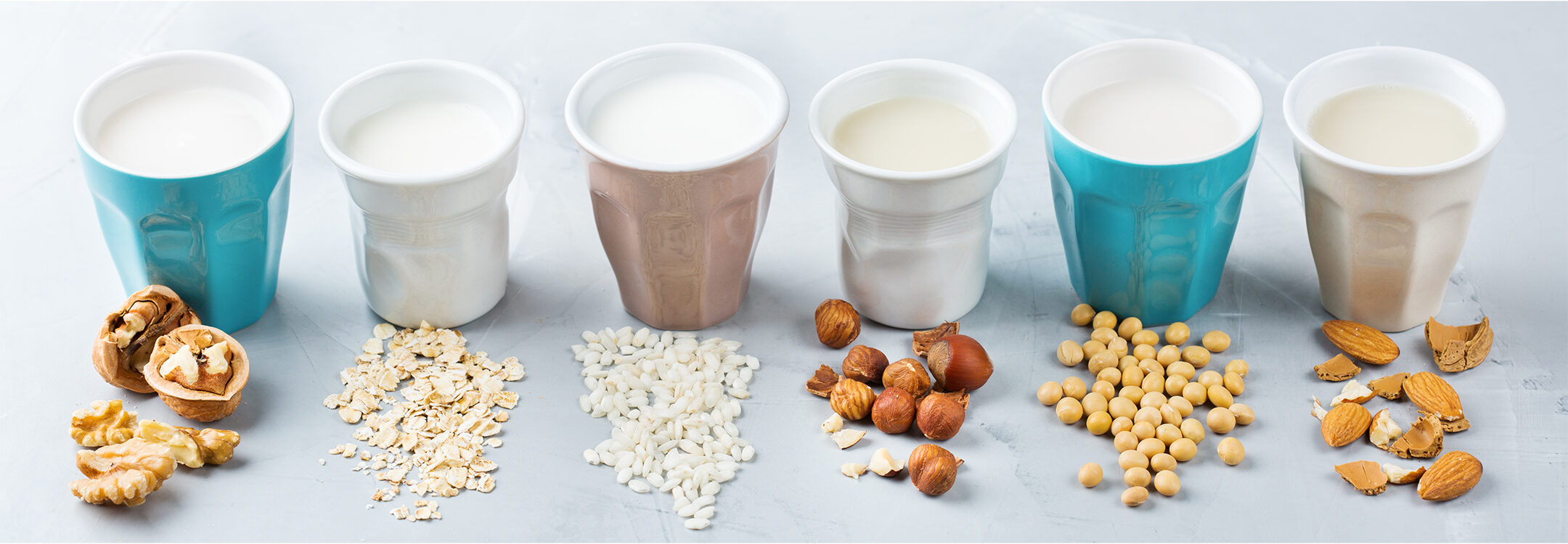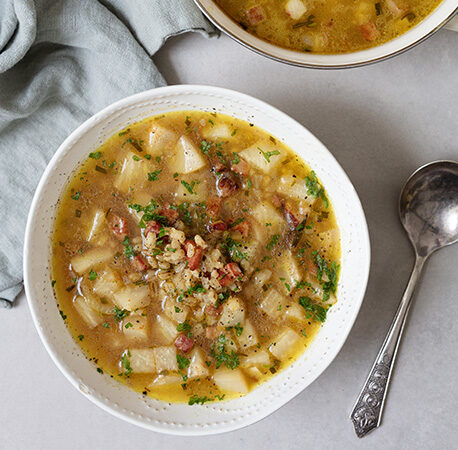Soy milk
Soy milk is very versatile and can be used in place of cow’s milk in any recipe. It can be used in anything from cereal and coffee to smoothies and savoury dishes, and is stable at high temperatures.
Pros: In general, soy milk is the least processed of all the alternative milks. It delivers the same amount of protein as cow’s milk, and contains more potassium than any other dairy alternative while also being low in saturated fat, plus it’s vegan-friendly.
Cons: It’s generally low in protein and can’t be used as a milk substitute for toddlers due to low calorie levels. Soy is also a common food allergy and most prevalent in children. It has a thick texture and may become lumpy towards the bottom of the carton. People who are intolerant to the protein in cow’s milk are often intolerant to the protein in soy milk, too.
Almond milk
Almond milk‘s creamy texture works well in coffee, cereals, porridge and smoothies, but many find it too sweet for savoury cooking.
Pros: It’s low in fat and calories, and is a good source of magnesium and vitamin E, and is also vegan-friendly.
Cons: Almond milk is unsuitable for those with nut allergies. It’s too low in protein and calories to be used as a milk substitute for toddlers. Although some brands contain vitamins D and E, these nutrients are fat soluble, meaning they may not be absorbed unless you’re having the milk with a higher-fat food. Almond milk can also be quite expensive.
Oat milk
Oat milk is light with a mild, vaguely sweet flavour, and is best used in baking, lighter cream soups, sauces and mashed potatoes.
Pros: Oat milk can be used as a milk replacement from the age of two if you choose higher-fat varieties. Oat milk is a source of fibre, in particular beta-glucan, a type of soluble fibre linked to improved blood sugar and cholesterol levels. It’s a good source of vitamin E and folic acid, as well as being vegan-friendly and cholesterol-free.
Cons: It’s relatively low in protein and high in sugar. Its thinner texture means that it’s not very suitable for use in baked goods. Unless specifically made with pure gluten-free oats, coeliacs and those with a gluten intolerance should steer clear.
Coconut milk
Coconut milk can work very well in baked goods, thanks to its nutty flavour, and is also suitable for adding to coffee or smoothies.
Pros: Coconut milk is fortified with vitamin B12 and vitamin D and rich in lauric acid, a heart-healthy saturated fat that improves HDL (good) cholesterol. It is vegan-friendly and cholesterol-free, but not suitable for those with a nut allergy.
Cons: Although low in natural sugars and calories, it contains more fat than other milk substitutes.
Oat milk
Oat milk is light with a mild, vaguely sweet flavour, and is best used in baking, lighter cream soups and sauces and mashed potatoes.
Pros: Oat milk can be used as a milk replacement from the age of two if you choose higher-fat varieties. Oat milk is a source of fibre, in particular beta-glucan, a type of soluble fibre linked to improved blood sugar and cholesterol levels. It’s a good source of vitamin E and folic acid, as well as being vegan-friendly and cholesterol-free.
Cons: It’s relatively low in protein and high in sugar. Its thinner texture means that it’s not very suitable for use in baked goods. Unless specifically made with pure gluten-free oats, coeliacs and those with a gluten intolerance should steer clear.
Goat’s milk
Pros: Technically not classed as ‘dairy,’ goat’s milk can be a great option for those who don’t require a vegan option but are lactose intolerant. It is also the most similar to cow’s milk from a nutritional perspective.
Cons: Not suitable for vegans. Those with an allergy to cow’s milk protein (as opposed to lactose) are likely to have a similar allergy to goat’s milk protein.
- summer events
- small business
- gut health
- OATLY
- healthy
- Crudo
- top tips
- All Together Now
- fridge cake
- Events Waterford
- me auld flower
- Events Ireland
- food festival
- news
- dublin
- events Dublin
- dublin festival
- Home-Cooking
- food and drink festival
- online cooking course
- festival line-up
- cooking
- Summer festival
- eco-friendly
- Events
- cosy
- Festivals Ireland
- wine
- Body & Soul
- grapes
- music festival
- south africa






You have to be signed in to comment this post.